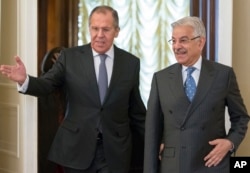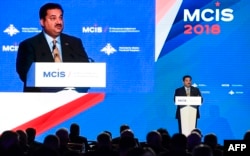Russia and Pakistan have held their first national security advisers-level bilateral talks in Moscow, focusing on prospects for closer cooperation in defense, space, cyber security, nuclear, intelligence-sharing as well as trade.
Pakistani National Security Adviser, Nasser Janjua, and Secretary of the Security Council of the Russian Federation, Nikolai Patrushev, led their respective delegations in the two-day meeting that ended on Monday.
A statement released after their meeting said the Pakistani delegation included senior military, civilian, intelligence and officials from the Strategic Plans Division, which oversees the country's nuclear weapons and missiles program.
The two sides expressed satisfaction at "the positive trajectory and progression" of mutual relationship at bilateral and multilateral levels, the statement noted.
Monday's wide-ranging high-level discussions happened as a Russian business delegation is due to arrive in Pakistan later this week to explore investment opportunities in various sectors, including banking, railways and telecommunications, government and diplomatic sources told VOA.
The turnaround in bilateral relations comes as Islamabad's decades-old, but often mistrusted, relations with Washington have again deteriorated in recent years.
The tensions primarily stem from allegations Pakistani security institutions harbor and support Taliban insurgents waging a deadly war on Afghan and U.S.-led international forces in the neighboring country.
Pakistan rejects the charges and insists Washington is scapegoating the country in the wake of deteriorating Afghan security.
Declining U.S. economic assistance to Pakistan was compounded this year by the Trump administration's decision to also suspend military assistance until the country takes decisive action against militant sanctuaries on its territory.Last week, the U.S. announced new travel restrictions for Pakistani diplomats working in the United States.
Analysts say as the United States appears to be cooling its relations with Pakistan, regional powers like Russia and traditional ally China are courting the country.
"Russians have overcome bitterness of Afghan war days. They see U.S. interest in Pakistan is waning and Islamabad is looking for strategic alternatives," said Syed Talat Hussain, senior newspaper columnist and television political talk show host.
Beijing and Moscow are "filling the power vacuum" as they try to "enlarge" their influence in Asia, Hussain noted.
"They [Russians] see Islamabad cash-strapped and investment-hungry and its army trying to come out of Washington's embrace," he said.
Pakistan sided with the U.S.-backed Afghan armed resistance of the 1980s that forced the Soviet occupation forces to withdraw from Afghanistan.
In a recent interview with VOA, Pakistani Defense Minister Khurram Dastgir said Islamabad and Moscow have been able to "transcend" their history of mistrust, leading to improved mutual ties.
"It is a beginning because, of course, that history of mistrust and essentially standing on two opposite sides is there; but, both countries, because of many geo-strategic reasons, now find it a more optimal path to be cooperating with each other," noted Dastgir.
The bilateral re-engagement between Islamabad and Moscow gained traction in 2014 when the two signed a defense cooperation framework agreement during the Russian defense minister's landmark visit to Pakistan.
Under the agreement, Pakistan has purchased four Russian Mi35 combat helicopters to bolster counterterrorism efforts. The delivery of more aircraft is in the works, along with other military hardware.
Pakistani and Russian special forces conducted joint military exercises in 2016 and 2017, and plan to do so again this year, focusing on how to counter terrorism in the region.
Russia and Pakistan are also in talks for potential multi-billion-dollar energy deals, while Moscow will also build a gas pipeline linking the Pakistani cities of Karachi and Lahore.
China has invested an unprecedented $19 billion in Pakistan in the past three years to help the neighboring country build roads, railways, power plants, and ports.
Beijing has pledged to invest an estimated $62 billion by 2030 under the massive cooperation deal known as China-Pakistan Economic Corridor, or CPEC and declared as the flagship project of BRI.






